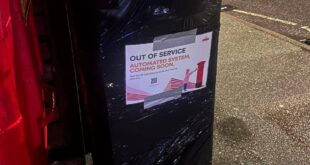Dr Steven McCabe, associate professor with the Institute for Design and Economic Acceleration at Birmingham City University, said that the UK’s financial situation will undoubtedly get collectively harder and that further use of zero-hour and temporary contracts can be expected as the country battles recession.
He added that he was alarmed by the announcement that many councils in England are, due to increased costs associated with dealing with Covid-19, likely to be unable to pay their bills and will go bankrupt.
Councils have a collective bill of £3.2 billion. Birmingham, the largest authority in Europe, has a shortfall of £212 million. The smaller Telford & Wrekin authority says it has a £19m budget hole.
More Covid-19 coverage:
Dr McCabe said: “The UK’s economic situation will undoubtedly get collectively harder. There is a danger that we will see 1980s levels of unemployment and the attendant social consequences.
“Royal Mail’s news that it is going to implement a cost-cutting plan to remove 2,000 jobs, mainly among management which is currently 10,000 strong, only adds to the impending sense of woe. It is to be feared that, contrary to what was said before the crisis, we will see even more use of zero-hour and temporary contracts.
Dr McCabe also warned of the impact of a second wave of coronavirus infections, adding: “Restrictions will need to continue until a vaccine is developed assuming, of course, it happens.
“Because of indecision and confusion by a government with limited understanding, we’ve ended up the worst of all worlds. Ending lockdown and decreasing the two-metre rule prematurely as many scientists believe, may result in infections and, very sadly, deaths rising again in coming months.”
Meanwhile, a survey by UK Finance today revealed more than two thirds of businesses in the region have been negatively impacted by the Covid-19 pandemic.
While a minority have managed to keep trading, or even expand, large numbers of companies are disclosing that they don’t expect to return to growth soon. And with sales falling, many are dipping into their cash reserves.
The winners:
While the pandemic has been grim for business, some companies have been thriving because of dramatic shifts in consumer behaviour, writes James Pugh.
They have been able to make the most of the situation as many people have been forced to self isolate and work from home where possible.
At the outbreak of coronavirus the demand on major supermarkets surged. The increase in purchases such as tinned tomatoes, beans, pasta, meat and the infamous toilet roll to mention a few, resulted in scenes of empty shelves across the country.
While the supermarkets were adamant that we had plenty of food in the UK, the additional demand meant supermarkets couldn’t get supplies delivered to the stores, and stacked on the shelves fast enough. This was primarily due to people stockpiling of foods, resulting in shops putting restrictions on the number of each item customers could purchase.
Nevertheless, this has led to record sales figures at supermarkets such as Tesco, Aldi, Lidl and Asda. In fact, all supermarkets have been going on a recruitment drive to meet demand. Food retailer Co-op, which has stores across the region, has also taken on 5,000 extra store workers to cope with increased demand, offering temporary employment to hospitality workers who had lost their jobs.
/cloudfront-us-east-1.images.arcpublishing.com/shropshirestar.mna/SHVWVZ4RFRDVLAFJ5ARXB2YXFI.jpg)
Reduced mobility and an increase in stockpiling goods have also let to greater demand from food suppliers. In March, Market Drayton-based dairy giant Müller launched a major recruitment drive for up to 300 additional key workers to help feed the nation during the pandemic. It followed strong consumer demand for dairy products like fresh milk, yoghurts and butter.
Agricultural firm Wynnstay, which has sites across the region, has had to recruit 25 additional staff to deliver the level of support needed for its customers as the business introduced an order and collect system at its 55 depots.
Finance director Paul Roberts said: “We can’t wait to see the back of coronavirus – but being treated as an essential supplier we were able to continue to trade through and make the best of a bad job.”
With many major fast food companies such as McDonalds and KFC taking the decision to completely close during lockdown, independent takeaways have also been busier than ever, many starting up delivery for the first time. For many, a crisis became an opportunity.
/cloudfront-us-east-1.images.arcpublishing.com/shropshirestar.mna/QFEO2P34WJC2PP3LEQ7G3SH35M.jpg)
Parcel delivery giant DPD, which has its headquarters in the West Midlands, recently revealed it is creating 6,000 jobs after a boom in online shopping. DPD will be investing £200 million to expand its UK network to meet the “unprecedented” surge in demand for its next-day parcel services.
The company is spending £100 million on vehicles, £60 million on 15 new regional depots and the rest on stepping up technology.
Chief executive Dwain McDonald said: “We are experiencing the biggest boom in online retailing in the UK’s history and we are making this unprecedented investment”
With many people working from home, video conferencing start-up Zoom has benefited massively.
The company’s sales and share price are already up over 50 per cent in 2020.
Katy Jones, managing director at Midlands-based PC Net Solutions said she was pleased she was also able to come to the aid of businesses that needed to implement immediate changes within their businesses due to the lockdown.
She said: “IT is an industry dominated by constant change so, when many business owners were trying to work differently, we were able to help them to make the changes, support them to adjust and reassure them that change is not necessarily a bad thing.”
The losers:
The coronavirus crisis has been bad news for most industries and companies of all sizes across the UK.
It has been worse for some than others, but as businesses emerge from lockdown and the end of the Government’s furloughing scheme approaches, those that have come off worst are now having to take the drastic step of making redundancies.
That has today led to predictions that we should expect the worst bout of unemployment since the 1980s. The true damage of Covid-19 will become clear between now and Christmas.
/cloudfront-us-east-1.images.arcpublishing.com/shropshirestar.mna/HFZXBXXHNRB2ZJ5H4HV4QV3IIE.jpg)
Many big name companies that are among the losers of lockdown have already announced hefty job losses due to the pandemic, including British Gas owner Centrica, the Royal Mail and airlines easyJet and British Airways.
The aerospace sector in the West Midlands is already experiencing the fallout from the woes of the air industry, with orders falling.
Many companies supplying jet manufacturers are starting to see orders fall, and last week Collins Aerospace, which has two big factories in Wolverhampton, revealed plans for 255 jobs to go. MJ Sections in Netherton and Halesowen is also making up to 45 redundancies.
The car industry is another that has experienced tough times due to the outbreak of Covid-19 with manufacturers like Jaguar Land Rover forced to shut plants, including its engine manufacturing centre at the i54, for long periods.
/cloudfront-us-east-1.images.arcpublishing.com/shropshirestar.mna/R5ECG2FSIFEEJCVOHNZYQCDKTM.jpg)
Earlier this month JLR revealed it is to cut up to 1,100 temporary agency jobs after the coronavirus pandemic badly hit its sales. Workers on temporary service contracts at Wolverhampton, Solihull and Castle Bromwich could lose their jobs by the end of the year with the first wave of cuts to take place by the end of July.
Car sales were down 89 per cent on the year last month and the slump is likely to hit the many manufacturers in the region in the supply chain for JLR and the other major car makers.
About 1,500 jobs are set to be axed and another 12 showrooms closed at struggling car dealership Lookers as the group plans to slash costs in the face of the crisis and a tough car market.
The pandemic has been bad news in the main for most brewers as restaurants and pub chains were forced to shut early in the crisis and are not set to reopen until July 4.
/cloudfront-us-east-1.images.arcpublishing.com/shropshirestar.mna/QMIXMZT5YRCGXOHIQ4KGNKG7XA.jpg)
Retail has also been hit hard during the lockdown with non-essential shops closed. Merry Hill’s owner Intu is in a fight for its very survival.
Shropshire furniture retailer Alan Ward has been a casualty, with stores in Shrewsbury, Chester, Newcastle-under-Lyme and Winsford failing to reopen after the lockdown lifted on June 15.
Shoe Zone is axing 20 stores and is cutting jobs at its head office and Monsoon Accessorize will close 35 and shed 545 staff.
Agriculture has continued through the crisis, but dairy farmers, including many in Shropshire and Staffordshire, were hit by a big fall in demand because of the closure of restaurants and cafes.
Some had to pour fresh milk away because it was not needed by the dairies.
The tourism sector has also been hard hit with caravan parks and camping sites forced to shut and museums, like the Black Country Living Museum and Ironbridge Gorge Museum Trust, unable to open for the normally busy spring and early summer season.
Kidderminster carpet maker Brintons also announced the closure of its Telford factory last week with the loss of 72 jobs.
The building and construction sector is also seeing job losses with Travis Perkins to close 165 smaller builders’ merchants and make around 2,500 redundancies.
Source link



